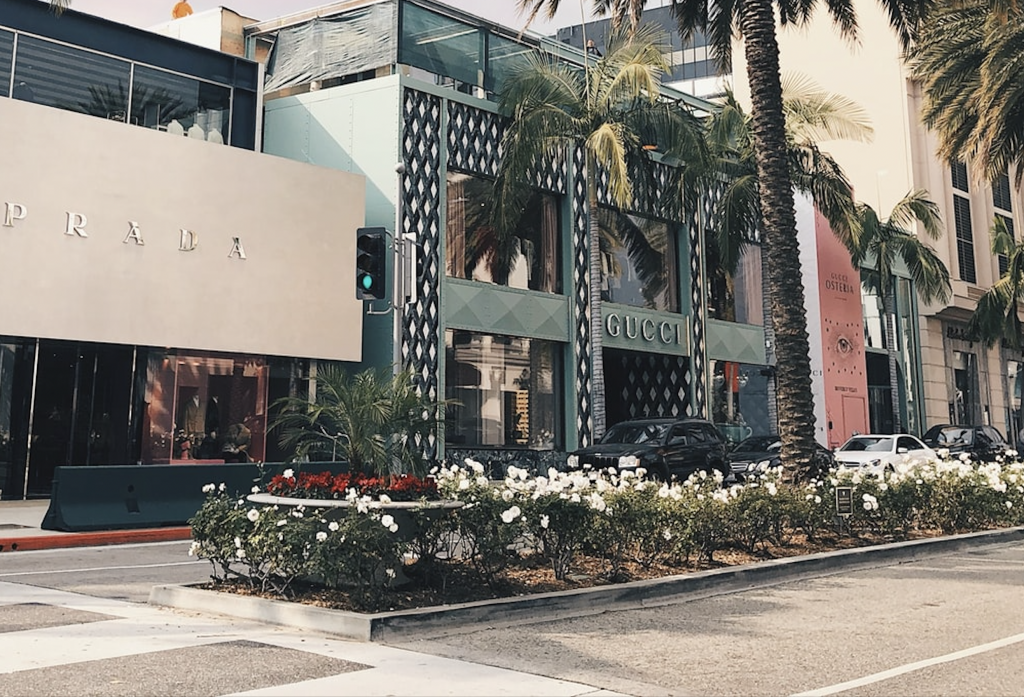Companies like Valentino, Stella McCartney, and Saks Fifth Avenue are currently engaged in litigation centering on long-term retail leases for stores located amid some of the most valuable real estate in the country. And they are not alone. Many companies have been wrangling with their landlords (in and out of court) in furtherance of attempts to get out of their pricey, years-long leases in the wake of COVID’s decimation of brick-and-mortar retail, and yet, at the same time, at least some companies are doubling-down on their physical expansion, albeit under markedly different terms.
In its Q4 revenue report, The RealReal revealed that it is one of the companies seeking to expand its physical footprint in the wake of COVID-19. The San Francisco-based resale titan asserted that in the three months ending on December 31, 2020, it opened “a neighborhood store” in Palo Alto, California, a “smaller footprint” outpost that was followed by similar stores in Brooklyn, New York, and Newport Beach, California, the latter of which opened in Q1 of 2021. Not finished, the company said that it plans to open approximately 10 neighborhood stores by the end of Q2.
Citing the success of its existing brick-and-mortar outposts, including those in New York City, California, and Chicago, and the ability of brick-and-mortar “to deeply engage with the company’s most valuable customers and significantly unlock supply,” The RealReal cited the terms of the newly-entered lease agreements as helping to drive its decision to expand at this time. Speaking on a call with analysts last month, founder Julie Wainwright said that “the rents in the neighborhoods have dropped precipitously and the willingness of landlords to do shorter term leases also [has been] critical to our decision making.”
Wainwright’s statements come in light of a larger trend in real estate, which is being born from the fact that “the financial pressures faced by many retail, hospitality and leisure tenants has swung the balance of power in lease negotiations away from landlords,” according to Burges Salmon LLP attorney Will Hall. “Since the financial repercussions of the pandemic started to materialize,” Hall says that “tenants in the retail sector have been seeking rent concessions and abatements in their existing leases, and pushing for more flexible lease terms” – both in regards to duration and rent calculation – “when signing up to new leases.”
And if The RealReal’s enduring push further into brick-and-mortar is any indication, tenants are getting good deals.
Among the most immediate results of that shift in power? An adoption of turnover-based leases, ones in which a link exists between the revenue a company brings in from the space it leases and the rent it pays (a trend that has adopted with increasing frequency in recent years), as well as the adoption of COVID-19 clauses aimed at specifically addressing and mitigating new risks. Another big development: shorter commercial leases. Global commercial real estate services company JLL, for instance, noted this summer that “in Hong Kong, an average office lease lasts three years. In the U.K., it is six. In the U.S., it fell 15 percent in the first five months of 2020 to seven years – and it is likely to fall farther.” And the same goes for storefronts.
“Corporations want the ability to react to a host of unknowns brought on by the coronavirus and economic pressures, so they will continue to pursue options that provide them with enhanced flexibility for the foreseeable future,” according to Ben Munn, JLL’s Global Flex Space Lead, said. “Whittling down lease terms is certainly part of that effort,” and it is being readily reflected in negotiations as thousands of retail leases come up for renewal.
“Their duration is increasingly shrinking, as businesses grapple with an unpredictable future and look for ways to slash costs, stay flexible and maintain leverage over their landlords, even after the health crisis abates,” CNBC’s Lauren Thomas echoed late last month, pointing to willingness among real estate owners, such as mall giant Simon Property Group and Tanger Factory Outlets, which said that “they have been doing more extremely short-term deals for pop-up shops during the pandemic.”
But just as turnover-based rents are not entirely novel (Saks’ lease with the Miami-based Bal Harbour Shops, for instance, dictates that it pay “‘percentage rent’ in amounts determined by [its] ‘net sales’ from the Saks premises”), neither is the push towards shorter lease terms. While Valentino, for instance, revealed in its ongoing legal battle that the 2013 contract that it entered into for the sweeping space on Fifth Avenue in Manhattan is slated to last for a whopping 16 years, more mass-market entities whose outposts are not located in the epicenter of luxury retail, such as Vans and Timberland owner VF Corp., say that “leases for its stores have been trending shorter for years,” per CNBC. “The way we structure our leases now allows us to be quite nimble, quite agile, and … we can pivot as consumer behavior changes,” CFO Scott Roe told CNBC, noting that its average lease term is about four years, and will soon be “even shorter.”
CNBC also revealed that David Simon, CEO of mall owner Simon Property Group, the largest shopping mall operator in the U.S. told analysts during a conference call in early February that it is signing more three-year leases than usual in light of tenant interest in shorter leases.
While there are certainly downsides to shorter lease terms from the perspective of a landlord, Simon said the Indianapolis-headquartered retail giant is onboard with shorter durations, saying, “I would rather negotiate two or three years from now [than have an empty store].” After all, Hall notes that “arguably some income is better than no income,” and more than that, maintaining occupancy rates, particularly in mall settings, is beneficial given the prevalence of co-tenancy clauses in retail leases, which generally enable a tenant to reduce their rent or terminate their lease if key tenants or a certain number of tenants leave the property.
Such developments are not limited to shopping malls, though. Tishman Speyer, the landlord of New York City’s Rockefeller Center, for instance, made headlines late last year when it revealed that it had come up with “a unique solution for retailer woes, a new six-month lease program.” Motley Fool reported that in furtherance of a venture called RC Capsule, Tishman Speyer has sought to offer brands space to take up residence “for six months at a time, introducing them to city goers right in the middle of Rock Center’s well-established retail experience.” Steven Alan and Jill Lindsey were among the retailers that launched six-month pop-ups thanks to the RC Capsule initiative.
Ultimately, given enduring pandemic and economic uncertainty and resulting changes in consumer behavior, “There will not be a one-size-fits-all model for a leasing structure,” Garrick Brown, VP of retail intelligence, Americas retail services, at Cushman & Wakefield, wrote in a client note. “I suspect that there will not be one correct strategy. It’ll really be a case-by-case basis.” The one thing he did say for sure: “The leverage is undoubtedly on the tenant side right now, and landlords, I think, would be foolish to not consider every option.”











